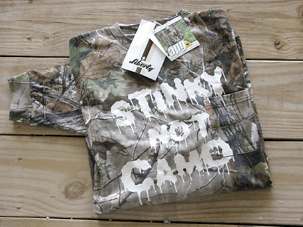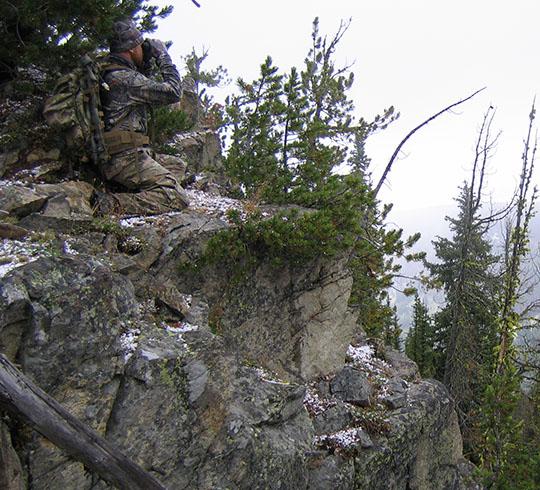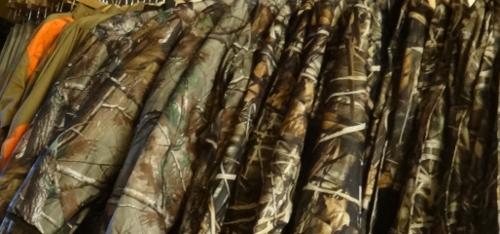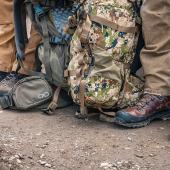Smelly Little Secrets
The musty truth behind big-box hunting apparel.
Here’s an untold story regarding your hunting gear and what happens before you wear it. In the process, perhaps it will change the way you shop for these items. I worked behind the scenes at a big-box distribution center in the Quality Assurance department—these nasty secrets were learned firsthand.
Let’s start with some facts: most hunting apparel items are manufactured overseas. Monsoon season in Asia is from early June to late September. Most sporting good companies have orders of apparel items shipped to distribution centers in the U.S. in July and August. What’s the correlation? Water. Boxes of finished apparel often sit on docks waiting to be loaded onto containers for shipment to the U.S. The boxes become saturated in the heavy downpours, and eventually the water seeps into the items inside. The boxes are loaded onto the containers—which have the potential to leak as well—and travel across the water for weeks before they arrive at port. The boxes are then offloaded from the containers and reloaded onto semi trailers, then shipped to various distribution centers.
When the merchandise arrives at the distribution centers, it gets offloaded and the fun begins. Pictures are taken of the merchandise and emailed to the vendor. The vendor typically agrees to pay for any related costs to “fixing” the items and also it to the company at a discounted price. The vendor doesn’t want the merchandise shipped back, as the cost of shipping it back would be astronomical, and the receiving company doesn’t want to return the items as they have already been advertised in catalogs and online. Keeping the wet or damaged items at a discounted price means a high profit margin for the company who received them.
The merchandise is inspected and decisions are made regarding the condition of each item. If the items are damp they are hung up to dry or thrown into an industrial dryer. Patches of mold are scraped off and hangtags are removed. Extremely wet or moldy items are sent to a dry cleaner. The dry cleaner gets everything looking shiny and new. The items are packed into new plastic bags, hangtags are added, and the items are boxed up and shipped back to the distribution centers.
Customers who order these items online often don’t remove them from the bag until the night before the hunting trip. The garment looks fine and it fits well. In the field, the hunter puts on deer scent but doesn’t have any luck—nor do any of his friends hunting within a two-mile radius. Could it be the dry-cleaning chemicals wafting through the air?
Here’s how to get outdoor gear that won’t stink to high heaven. When shopping for apparel:
1. Examine the garment closely. Look at the sewn-in tag to see where the item was made. Is there mold hidden in the camouflage or on the hangtag? Are there staple marks in the sewn-in tags where dry-cleaning tags were attached? Are there multiple silica gel packets in the pockets? Silica gel can absorb 40% of its weight in moisture. One in each pocket is normal—if you find more than that, odds are the item was wet and silica packets are an attempt to dry it out.
2. Smell the item—turn a sleeve or a pant leg inside out and take a good whiff. (Don’t do this if you are shopping for underwear as you may be escorted out of the store.) The main ingredient in dry-cleaning chemicals is Perchloroethylene, or Perc. This chemical is supposed to be removed from the clothes during the dry-cleaning process, but the dry cleaner is often working fast with limited staff trying to dry clean thousands of items by a specific deadline. Perc has a sweet chemical smell that has been compared to ether. Perc is considered a hazardous material, and if you smell this or other chemical scents, don’t buy the item. On one occasion I remember spraying Febreeze on hundreds of big-game hunting coats. If the item smells musty or like Febreeze, leave it on the rack.
3. Don’t ask questions—if you ask a retail clerk if the item has been dry cleaned they will tell you no, or that they don’t know. These secrets don’t leave the distribution centers. You are now part of an elite group of people with insider knowledge.
4. I would not advise ordering big-game hunting apparel via the internet or through a catalog; but if you do, always check the item immediately after it arrives. And if you “lose the game,” just remember that I told you so.














